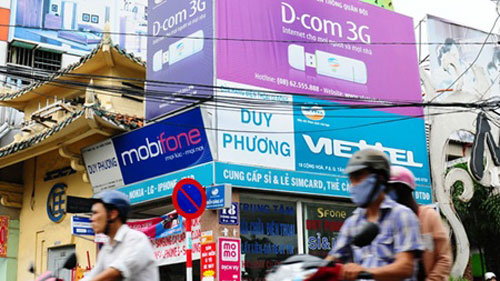
 |
|
Viettel, Mobifone and Vinaphone still maintain a monopoly, with a total annual turnover of US$5.5 billion last year. — Photo doisongphapluat |
In September last year, the Ministry of Information and Communications (MIC) approved the policy for implementation beginning January 1, 2017, after delaying it for more than two years. The MIC previously planned to implement the policy in mid-2014 but later changed its mind, saying it would need more time to prepare comprehensive policies to allow the new method to run smoothly.
But Vietnamobile and Gtel said they were still not competent enough to implement the policy as scheduled because they have been undergoing a business restructuring process and needed more time to mature.
At the project preparation meeting held last Friday, representatives of Vietnamobile and Gtel said they wanted the MIC to postpone implementation of the policy up to end-2018.
Meanwhile, representatives of Viettel, MobiFone and Vinaphone, which hold 90 per cent of the country's mobile phone service market share, said they were prepared to implement the policy as scheduled.
Phung Van Cuong, vice general director of Viettel Telecom, said the company already has experience in implementing the policy, as the mobile phone network it invested in recently in Peru was already implementing it.
Cuong urged the ministry to implement the policy as planned to meet the increasing demand of Vietnamese mobile phone users.
According to MIC, once applied, the MIC's telecommunications department will assume central management of all mobile phone numbers, a departure from the old practice of allowing each network provider to partially manage some of the numbers. This new policy has already been applied in 70 countries worldwide.
The new policy will give subscribers more freedom to select their network providers while raising the level of fairness in the competition among telecommunications companies.
In addition, it will allow telecommunications authorities to measure the development of the mobile phone market, especially in terms of e-commerce.
Founded in 2009, Vietnamobile is a joint venture of Ha Noi Telecom and the Hong Kong-based Hutchison Telecommunications International.
Founded in 2012, Gtel, a state-owned joint-stock company under the Ministry of Public Security, is the successor of the defunct Beeline Viet Nam.
Vietnamobile is estimated to have an eight-per cent market share and Gtel, two per cent.
While the Vietnamese telecommunications market has grown rapidly, Viettel, Mobifone and Vinaphone still maintain a monopoly, with a total annual turnover of US$5.5 billion last year.
Viet Nam has around 20 million 3G subscribers among more than 130 million mobile phone users, rising from 19 million in 2006 to 25 million in 2007, 74 million in 2008, 98 million in 2009 and 120 million in 2012.






- Hanoi honors outstanding faces in innovation, digital transformation
- Land deed digitization accelerated in Hanoi
- Vietnam's capital boosts iHanoi usage by citizens
- Technology, innovation identified as key drivers for Hanoi's growth
- Hanoi intensifies efforts to achieve its digital goals by 2025
- Second Hanoi Technical Innovation Contest launched
